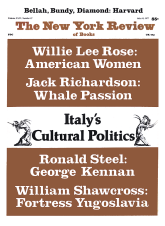In response to:
The Hard Case of Yeats from the May 26, 1977 issue
To the Editors:
“Hence, as Robert Lowell has asserted, Yeats couldn’t see anything” (NYR, May 26).
Why should one blind man say this about another? I suppose such a patronizing phrase might slip from one’s tongue in conversation or in an interview. However Denis Donoghue has a gift for isolating, slanting, and distorting when he paraphrases—often to make an unfair point, strangled in a web of qualification. In a short poem of mine called “Truth,” I have a half fictitious British poet, hostile to Yeats, say, “He had bad eyes, saw nothing.” Dare I say in this place that Yeats saw beyond the reviewer?
Robert Lowell
New York City
Denis Donoghue replies:
Mr. Lowell is intemperate. His courtesy, like his tongue, has slipped. The theme was not, of course, Yeats’s eyesight but his mind-sight; not a question of 20/20 eyesight, the nature of his retina, or the trouble he gave his oculist. I was talking about a certain tradition in Yeatsian criticism which ascribes to Yeats the habit of imagination which sees each object “only for the sake of what it answers to in him, not for what it is in itself.” I quote from Donald Davie’s Ezra Pound: Poet as Sculptor, the most explicit version of that tradition, lest it be thought that I am isolating, slanting, and distorting. As for Mr. Lowell’s part in this tradition, it would be tedious and exorbitant to track down the source of my evidence, whether it is in a poem, an essay, or one of those conversations or interviews in which Mr. Lowell’s tongue slipped. The question can be cleared up at once: if Mr. Lowell wished to dissociate himself from the notion of Yeats as an excessively symbolizing poet—and this is the gist of the tradition from Pound to Davie—I am surprised that he has not taken the present opportunity to do so.
This Issue
July 14, 1977



